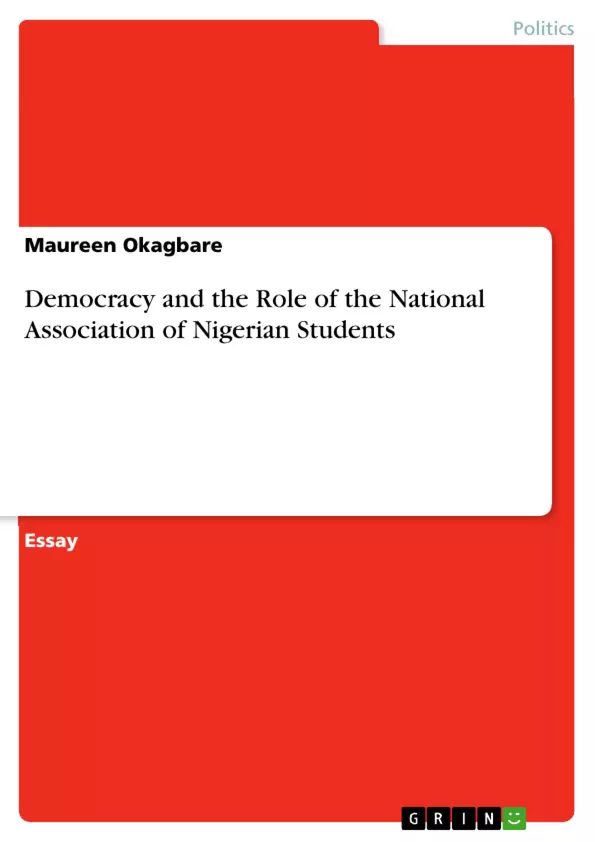The 2019 Presidential election of Nigeria was like a coup against the Nigerian people by the political elites that hold the resources of state. Families mourned 47 members killed during the ill-fated Nigerian Presidential elections of 2019 and many voters were disenfranchised. The so-called election results did not in any way reflect the votes and will of the Nigerian people home and abroad. After stealing the people’s mandate, losers are urged to go to court by the purported winner. Votes were burnt in the presence of police officers. Returning officers were forced to write results at gun point. Government officials were seen using soldiers to intimidate and kill Nigerians. People were killed in broad daylight by the same forces of darkness that have truncated the destiny of Nigeria.
Table of Contents
- Introduction
- Methodology
- Address
Objectives and Key Themes
The objective of this text is to address the National Association of Nigerian Students (NANS), urging them to reclaim their role as the conscience of Nigeria and actively participate in shaping the country's future. The author calls on students to reject manipulation by politicians and fight for their rights, referencing historical student activism as a model.
- The role of NANS in Nigerian democracy
- Historical examples of effective student activism in Nigeria and globally
- The impact of political corruption on Nigerian students and society
- The need for student unity and decisive action
- The consequences of political apathy and inaction
Chapter Summaries
Introduction: This introductory section establishes the historical context of NANS, highlighting its initial purpose as a unifying body for Nigerian students. It then contrasts this founding ideal with the contemporary reality, citing an instance where NANS leadership pledged votes to a presidential candidate during a student strike, thereby demonstrating a concerning prioritization of political expediency over student interests. The introduction sets the stage for the author's subsequent call to action.
Methodology: The methodology section briefly explains the author's chosen approach – a direct address to the student body – framing the subsequent text as a personal appeal. This intimate, almost conversational tone is designed to foster engagement and resonate with the intended audience, thus enhancing the persuasiveness of the author's message.
Address: This section forms the core of the text, a passionate call to action directed at NANS. The author outlines five crucial steps for students to take to shape Nigeria's future. It powerfully contrasts the potential of students – their numbers, energy, intellect, and access to social media – with the detrimental influence of corrupt politicians. The author leverages historical examples of successful student activism in Nigeria and other countries to inspire and motivate the students. It further underscores the dire socio-economic conditions facing Nigerian graduates, linking them directly to the failures of the political system. The section concludes with a stark warning about the consequences of continued silence and inaction, emphasizing the moral responsibility of students to fight for a better future.
Keywords
National Association of Nigerian Students (NANS), student activism, Nigerian politics, corruption, youth unemployment, education, democracy, social change, political apathy, historical student movements.
Frequently Asked Questions: A Comprehensive Language Preview
What is the main objective of this text?
The text aims to urge the National Association of Nigerian Students (NANS) to reclaim its role as the conscience of Nigeria and actively participate in shaping the country's future. It calls on students to reject political manipulation and fight for their rights.
What are the key themes explored in this text?
Key themes include the role of NANS in Nigerian democracy, historical examples of effective student activism (both in Nigeria and globally), the impact of political corruption, the need for student unity and action, and the consequences of political apathy.
What is the methodology used in this text?
The author employs a direct address to the student body, using a personal and conversational tone to foster engagement and enhance the persuasiveness of the message. It's framed as a personal appeal to NANS.
What are the main points covered in the "Introduction" chapter?
The introduction establishes the historical context of NANS, contrasting its founding ideals with contemporary realities. It highlights a specific instance where NANS leadership prioritized political expediency over student interests during a strike, setting the stage for the author's call to action.
What does the "Address" chapter entail?
The "Address" chapter is the core of the text, a passionate call to action for NANS. It outlines crucial steps for students to take to shape Nigeria's future, contrasting students' potential (numbers, energy, intellect, social media access) with the negative influence of corrupt politicians. It uses historical examples of successful student activism and highlights the socio-economic challenges facing Nigerian graduates, linking them to political failures. It concludes with a warning about the consequences of inaction.
What are the key takeaways from the "Methodology" chapter?
The methodology chapter explains the author's direct address approach to NANS, emphasizing the intimate and conversational tone used to connect with the intended audience and make the message more impactful.
What are the key words associated with this text?
Key words include: National Association of Nigerian Students (NANS), student activism, Nigerian politics, corruption, youth unemployment, education, democracy, social change, political apathy, and historical student movements.
What is the overall structure of the text?
The text is structured as a comprehensive language preview, including a table of contents, objectives and key themes, chapter summaries, and keywords. It's designed to provide a clear overview of the content.
Who is the target audience of this text?
The primary target audience is the National Association of Nigerian Students (NANS) and, more broadly, Nigerian students.
What is the overall tone of the text?
The overall tone is passionate, urging and motivational, aiming to inspire action and engagement from the student body.
- Arbeit zitieren
- Maureen Okagbare (Autor:in), 2019, Democracy and the Role of the National Association of Nigerian Students, München, GRIN Verlag, https://www.grin.com/document/505891



